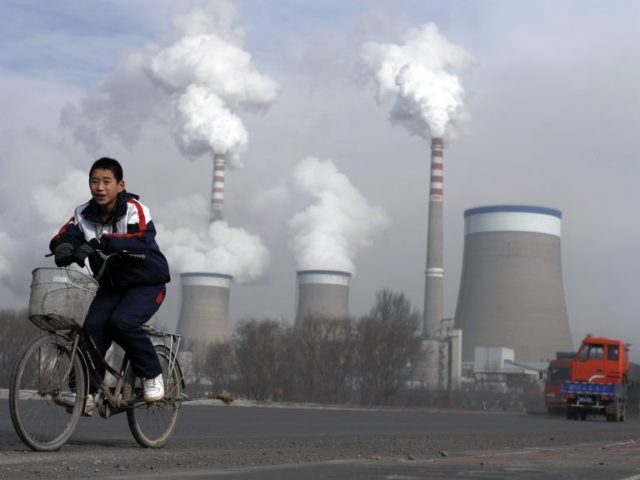China on Tuesday launched a major effort to ramp up coal production and stabilize coal prices ahead of an anticipated surge in electric power demand this winter.
China’s National Development and Reform Commission (NDRC) reportedly ordered mine operators to “produce as much coal as possible.”
CNN noted on Wednesday that China made an effort to scale back coal production this year to placate climate change activists, but those desultory efforts simply evaporated in the face of rolling blackouts that interfered with the Chinese Communist Party’s (CCP) industrial goals.
China’s power grid remains heavily dependent on coal and its international Belt and Road infrastructure program has littered the Third World with more coal-burning plants. China added over three times as much coal-fired generator capacity in 2020 as the rest of the world combined.
The Communist Party tried increasing the price of electricity and encouraging its subjects to reduce their power consumption, but in September the pretense of restraining coal production was quietly abandoned and coal inventories began growing again. Now the NDRC is telling mine operators to increase production by all means necessary, and outlawing shutting down any Chinese coal mine.
The NDRC met with China’s leading coal companies on Tuesday and told them to expect more regulatory controls on coal, including price caps and limits on coal profits. It also threatened a crackdown on price-fixing activities, collusion, and hoarding.
“The current price increase has completely deviated from the fundamentals of supply and demand, and the heating season is approaching, and the price is still showing a further irrational upward trend,” the NDRC said.
China’s voracious appetite for coal is impacting foreign markets, such as Indonesia, where coal prices have nearly quadrupled this year due to Chinese demand. Indonesian analysts say their market would only stabilize if China stopped buying coal entirely for two or three weeks.
That seems unlikely since Indonesia is now China’s biggest overseas coal supplier and last months’ shipments hit a record of 21 million tonnes. Indonesia’s coal is lower-grade and worse for the environment to boot.
China turned to Indonesia after coal from Australia was banned last year during Beijing’s ugly coronavirus feud with Canberra. China planned to make up for the shortfall by extracting more coal from Mongolia, but the Wuhan coronavirus pandemic hammered the Mongolian coal industry, leaving frustrated delivery drivers stranded in refugee camps without pay.
One enterprising Australian supplier, Coronado Global Resources Inc, got around the ban by selling coal from its mines in the United States to China. The Chinese are hungry enough for coal to play along.
Chinese officials on Wednesday sought to head off the expected backlash from climate activists against increased coal production by announcing plans for expanded forest, wetlands, and endangered species protection.
Chinese state media labored to spin the crisis by pointing out that other nations are experiencing coal-related power crunches as well, while Europe’s vaunted commitment to “clean energy” is not living up to expectations.
China’s state-run Global Times was not subtle on Wednesday in telling Western environmentalists to back off unless they want the global supply chain crisis to get even worse:
Reports say that Europe’s investment in fossil fuels has dropped significantly. However, clean energy has failed to effectively fill the gap caused by the reduction in fossil fuel supply. Moreover, the epidemic has led to chaos in the supply chain, while seriously clogged transportation has triggered a chain reaction. These all made gas prices raise two to six times, and electricity prices two or three times. Next, shortages and increases will spread to grain, meat and various consumer goods, causing an inflationary pressure.
The livelihood of most countries in the Northern Hemisphere will see the impact. More and more shelves at US malls will become empty, and US heating bills are expected to jump 54 percent this winter. As for European countries, they have an even lesser response capacity due to their smaller size.
What is happening in the world tells us that modernization is advanced, delicate but fragile. The destructive power of the COVID-19 pandemic is pervasive and will be far more destructive than the public health crisis itself. It will be a long time before the world returns to normal. Countries are likely to deal with a succession of crises that will repeatedly test their resilience.
Another Global Times piece on Wednesday hinted that China’s coal shortage might be partly a result of corruption, which the Communist Party will do its usual diligent best to stamp out.
“Chinese Premier Li Keqiang reiterated on Wednesday the country’s commitment to ensuring people’s heating, and continuing the efforts to crack down on coal marketing speculation, a clear and firm voice from the central government to put people’s livelihood at the forefront after a series of measures that have been taken over the past weeks to ensure the coal supply,” the Global Times reported breathlessly.
Li made it clear at the same meeting that “all-out” efforts were in progress to produce enough coal to meet China’s needs, even as winter rapidly descends upon the northern part of the country.

COMMENTS
Please let us know if you're having issues with commenting.